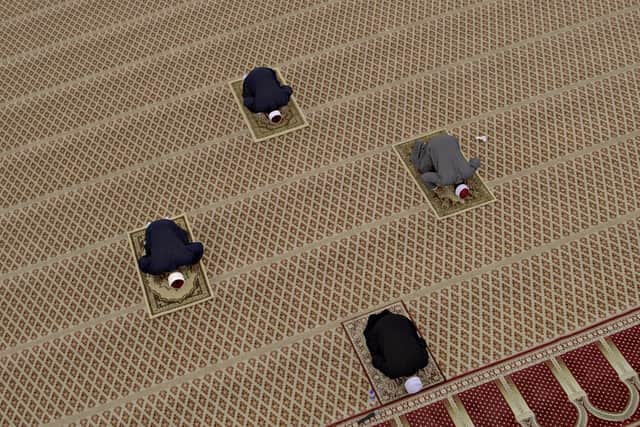When does Ramadan end? Date Muslim holy month finishes in 2021 - and when Eid starts
and live on Freeview channel 276
Ramadan is drawing to a close as 1.8 billion muslims around the world have observed the holy month.
It's when the Qur'an was revealed to Muhammad and it is classed as one of the most blessed months in the Islamic calendar.
Advertisement
Hide AdAdvertisement
Hide AdThe end of Ramadan is marked by a moon sighting and the most likely sighting date for the Shawwal moon will be Wednesday 12 May – kickstarting Eid al-Fitr celebrations on May 13.


This date was confirmed on Tuesday 11 May, when Saudi Arabia announced that the moon had not been sighted and that Eid would therefore fall on the Thursday.
Eid sees Muslims indulging in a feast after a month of abstaining from food and drink during daylight hours.
When does Ramadan end?
This year, Ramadan started on the evening of Monday 12 April in the UK.
Advertisement
Hide AdAdvertisement
Hide AdRamadan lasts between 29 and 30 days. The exact start date shifts slightly every year due to the observance of the lunar calendar, meaning celebrations fall around 11 days earlier each year.
When does Eid start?
The month of Ramadan begins when the first crescent of a new moon is sighted in the ninth month of the Islamic calendar - it ends depending on a verified moon sighting.
This year, Eid al-Fitr - also known as 'The Feast of Breaking the Fast' - will begin on 13 May.
However, Eid will look considerably different than usual again this year as no part of the UK is expected to reintroduce indoor private gatherings by 12 May.
How is Ramadan observed?
Advertisement
Hide AdAdvertisement
Hide AdThe holy month is a time of reflection and purification, so Muslims focus on prayer and fasting during Ramadan, with the Salat (daily prayers) of key importance.
The daily prayers also coincide with the hours of the fast, as Muslims Suhoor, the pre-fast meal, before sunrise and then finish the meal with the day’s first prayer, the Fajr.
The fast isn’t broken until sunset with the Iftar meal, which is eaten before the Maghrib, the fourth prayer of the day.
The Salat
Fajr: observed before sunrise
Zuhr: observed after noon
Asr: observed in late afternoon
Maghrib: observed after sunset
Isha: observed at night
Who participates in fasting?
All practising Muslims who have reached puberty are expected to fast during Ramadan.
Advertisement
Hide AdAdvertisement
Hide AdHowever, there are some exceptions, including menstruating or pregnant women and people who are unwell or have an illness.
The fasting period begins and ends at different times each day, as the period between sunrise and sunset changes throughout Ramadan.
The strict rules include abstinence from food and drink, including water, during daylight hours for the entire month. Smoking, sex and masturbation are also prohibited.
What is the timetable for fasting in 2021?
Some Muslim congregations and communities have followed the dates from Mecca in Saudi Arabia, while many of the 2.5 million Muslims in the UK waited for the first confirmed sightings of the moon here.
Advertisement
Hide AdAdvertisement
Hide AdAs Islam is a faith followed by 1.8 billion people globally, the sighting of the new moon varies from location to location and not all Muslims will break fast at exactly the same time.
Why are there two Eids each year?
The dates of Eid can often be confusing as the Muslim religion celebrates two Eids each year.
Eid Al-Fitr is the first, and comes at the end of the month of Ramadan.
Eid al-Adha is almost exactly two months later - this year it will take place in mid-July, andis the “feast of the sacrifice”.
Advertisement
Hide AdAdvertisement
Hide AdIt comes at the same time as many Muslims complete the Hajj pilgrimage.
Also known as the pilgrimage to Mecca, all Muslims are supposed to complete it at least once in their lifetime.
Eid al-Adha is said to be the most important, and sometimes referred to as ‘Big Eid’, while Eid al-Fitr is the lesser of the two.
Read more: